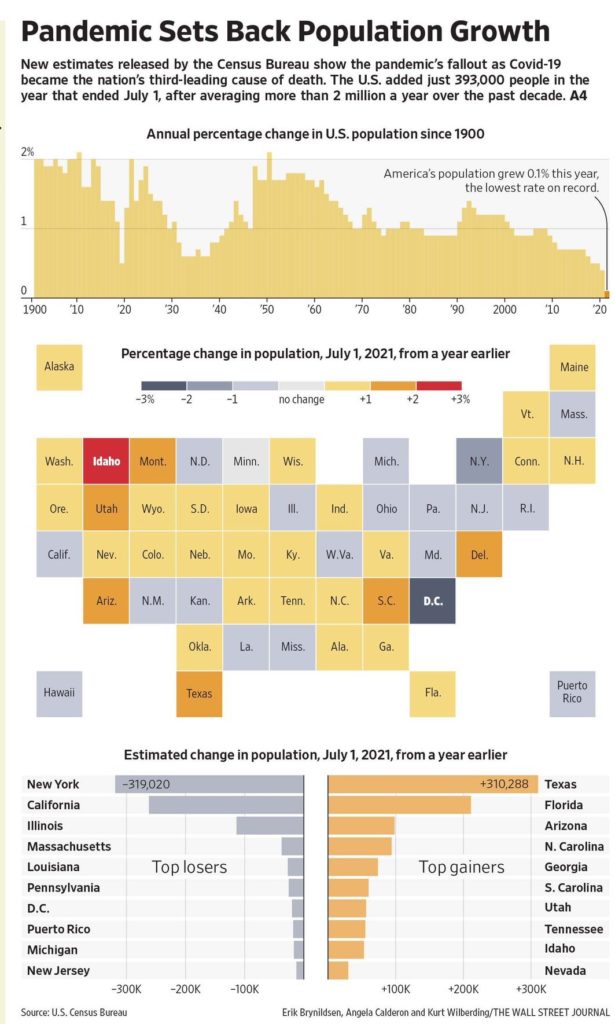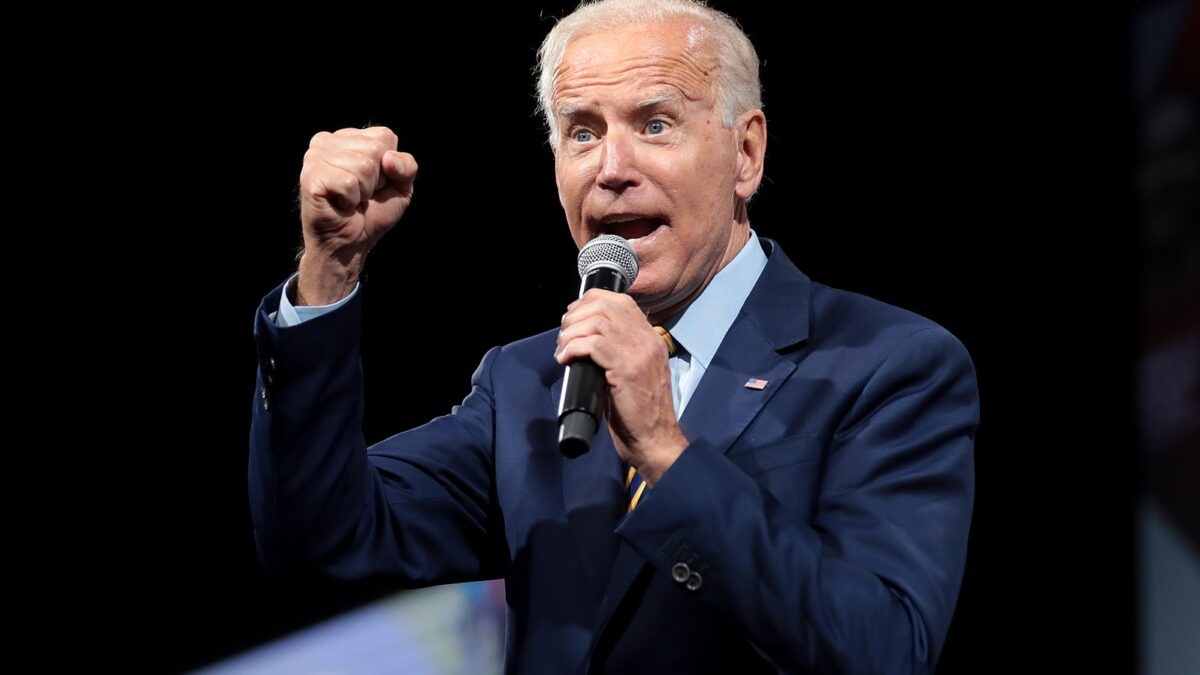New census figures show the United States added the fewest citizens in its entire history in 2021, with population growth at just 0.1 percent. The data also showed a continued exodus of Americans from Democrat-run states to Republican-run states, with New York, California, and Illinois losing the most residents and Texas, Florida, and Arizona gaining the most, respectively.
The Wall Street Journal posted graphics illustrating these trends on a recent front page, then editorialized about the trend, pointing out the correlation between strictness of lockdowns and population decline. Economist Mark Perry also demonstrated that the states gaining residents clearly have smaller government burdens and lower costs of living compared to the states that lost residents.

These are both pre-existing trends (except in California; 2020 and 2021 were its first two years ever to lose population), but the lockdowns and social unrest stemming from American leaders’ poor handling of the Covid-19 outbreak appear to have accelerated these trends.
Coasting Isn’t Leadership, It’s Laziness
Red states, however, also tend to accept this situation passively. Rather than seeking to be places of excellence and well-being for their citizens, often red states simply congratulate themselves that they “Aren’t Illinois or California,” and leave it at that.
But it’s not a mark of success to say one’s state is not as bad as those that have unleashed welfare dependents, homeless addicts, and violent criminals, just like it’s not a mark of success for public schools with middle and upper-class kids to perform somewhat better than schools that oversee mostly the children of never-married drug addicts. In neither case can such entities claim they made any improvements. They’re simply taking credit for other people’s choices and advantages. Coasting isn’t leadership. It’s the abdication of leadership.
In an article for the winter 2021 edition of American Affairs, The Masculinist’s Aaron Renn analyzes Indiana, where Republicans have controlled the legislature for a decade and the governorship since 2004. His analysis is applicable to many other red states, including those in the South and West. While Republicans have considered it a mark of success to attract large, mostly low-wage businesses and keep taxes relatively low, pursuing policies that favor business interests has come at the expense of serving the state’s voters and taxpayers, Renn says.
In fact, “too often what’s touted as small government is in reality a special interest giveaway,” Renn noted to a local reporter in a follow-up to his article. “…The success of Donald Trump, who rejected many core tenets of conservatism, in Indiana shows that there’s a bigger appetite for new thinking than the GOP leadership would want us to believe.”
Renn told the reporter “he is a lifelong Republican who is interested in ‘updating the Republican policy toolbox to respond to today’s 21st century realities, not the bygone Cold War era in which the legacy conservative policy consensus was formed.’” His article gives ideas for how local leaders can shift away from Republicans’ habit of subordinating citizens’ rights and freedoms to big business, to instead govern on behalf of those who elect them.
What Does It Mean to Put Citizens First?
“Absent favorable external factors like warm weather, the conservative approach has failed to generate demographic and economic success in states like Indiana,” Renn says. He chronicles how state leaders aimed to improve Indiana the midcentury Republican way, by focusing on fiscal policy such as cutting government spending and taxes, instituting right to work laws, using public money to subsidize politically favored local business districts and development deals, and subsidizing big businesses and career-focused schooling.
In other words, Indiana’s leaders did pretty much the same stuff as the leaders of 2021’s top ten population-growth states, but didn’t get an economic or population boost from it. Renn points out that Indiana isn’t an outlier in this respect. Many Midwestern and Northeastern states have seen the same: “Looking around the Old North region, one will see many states that are a lot like Indiana: low population growth, a stagnant labor force, many shrinking counties, weak job growth, and limited success at attracting higher-wage, new economy industries.”
Renn thinks that, as with schooling, factors politicians can’t control, such as weather and culture, seem to have the most decisive effects on state health. This means, Renn said in the interview, “Rather than believing the iron law of the marketplace compels us to disadvantage our own citizens in order to earn the favor of the economic gods, we can instead put our citizens’ interests and preferences first instead.”
Fight For Your Voters On…Anything At All
What would that look like? Well, for one thing, it would include Republicans adopting the Donald Trump and Ron DeSantis model of openly fighting back in the culture war. Or fighting for their citizens on pretty much any level — education, health, against federal regulations and bankrupting programs, threats of canceling people’s jobs, anything.
“Red state Republican politicians need to start caring much more about their voters’ priorities than they presently do. This is particularly important today, when most of our major institutions have fallen under the sway of progressive orthodoxy, leaving Republican state governments as one of the few powerful institutions remaining that can stand up for conservative citizens,” Renn writes.
He points out how Gov. Mike Pence and the Republican legislature made Indiana the state most hostile to conscience rights in the nation in 2015 at the behest of woke corporate. Indiana was the test case for leftist corporate pressure campaigns, and state Republicans’ immediate capitulation on religious liberty ensured the left would subsequently adopt corporate cancellation as a top political strategy.
It has now metastasized to the point that President Joe Biden used this tactic to implement his unconstitutional vaccine mandate, while Republicans scrambled to do mostly nothing in response. Indiana’s legislature refused to protect their voters against corporate manhandling on this issue also, repeatedly failing to protect Hoosiers from corporate and state university medical demands that are harsher than those in many blue states. Native daughter and new Supreme Court Justice Amy Coney Barrett followed suit. Indiana’s governor still requires children to mask in schools or be repeatedly barred from schooling for days at a time, a completely unscientific and abusive policy the legislature has refused to check.
Renn uses other examples, such as the state legislature overriding local tenant protections against slumlords, refusing to require employers to let pregnant employees go to the bathroom on the job, and the abuse of senior citizens in nursing homes: “Over 20 percent of Covid-19 patients in Indiana nursing homes died, compared with a 13 percent national rate. The state GOP’s response was to pass a law providing nursing homes with expansive immunity from liability for deaths in their facilities.”
“It is puzzling why state Republicans would side with employers like warehouses over their own pregnant voters when the owners of those warehouses are mostly large corporations that have fully embraced the ‘woke’ party line and are actively hostile to conservatism,” Renn notes.
For another current example, parents in Indiana, like those all over the country, want their legislators to ban critical race theory in the session that starts this week. Insiders say what they’re most likely to get is a bill that claims to do so while providing no enforcement teeth.
Deliver the Goods, Republicans, Or Die Quickly
Pissing on their voters and telling them it’s raining is the old Republican way of doing business that Trump staked through the heart. Hoosier voters went for Trump in 2020 by a 16-point margin. But, like the GOP in many other states, Indiana’s is run by people who act more like mini Mitch McConnells. That political era is a dead man walking. It’s the very embodiment of zombie Republicanism.
Flyover Americans don’t want politicians who sell out their own voters for 30 pieces of campaign silver. They want leadership. Leadership doesn’t mean giving your voters the bits that fell to the ground after campaign donors get their fill. It means delivering things the base actually wants, like Trump did.
One thing Trump delivered was punches that landed in the culture war. Another was protecting and preferring conservative voters, not their enemies.
“State and local governments are some of the few powerful institutions where conservatives retain some control,” Renn notes. “Thus, a prime emerging responsibility of elected leaders at the state level, especially in red states like Indiana, is to use the power of their offices to protect their communities against ideological coercion or abuse from other institutions. Red states must not only be willing to aggressively challenge any federal government overreach; they must also be willing to resist coercive behavior from the private and nonprofit sectors.”
“If Indiana Republicans did implement conservative voter preferences and aggressively defended their voters’ priorities, that might be a draw in itself,” Renn notes. Just look at how Florida has bloomed under a governor who shed the old Republican formula for the new one.
DeSantis is not Trump, but he sure as shootin’ learned from Trump. That’s exactly what the rest of the Republican Party needs to do as well — not just for their political future, but also for the sake of their voters.







